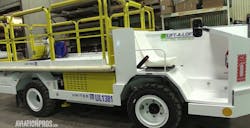Rain, rain keeps the airplane away.
Don't necessarily blame it on the rain -- not ours, anyway.
Three South Florida airports ranked among the top seven in the nation for flight arrival delays during the first half of June, a government report issued Friday shows.
And Fort Lauderdale-Hollywood International remains one of six airports nationwide expected to have the worst delays this summer, says the new study by the Department of Transportation's Office of Inspector General.
From June 1 to June 15, Palm Beach International ranked third-highest in the country in percentage of delayed flight arrivals. Miami International ranked sixth; Fort Lauderdale seventh. At each, nearly a third of all arrivals were late.
The agency does not specify reasons for the delays. Yet, despite a particularly soggy June in South Florida, rain may not have played a major role based on Federal Aviation Administration data, said Office of Inspector General spokesman David Barnes.
''Weather was NOT a significant factor at South Florida airports,'' he wrote in an e-mail. 'According to our research, most ( 2/3 to ¾) of the delays were on days when weather impacts were 'none.' ''
American Airlines spokesman Tim Smith finds that ''overly optimistic.''
''Anytime we have any level of thunderstorm or even potential lighting it can easily slow down the flow of aircraft in and out,'' he said.
In fact, the percentage of American flights that arrived on-time at MIA in June will be several percentage points below June 2004's 77 percent one-time performance, Smith said.
Meteorologists say last month was the ninth-wettest June in both Broward and Miami-Dade counties since the weather bureau started keeping records in 1913. There were 24 rain days in Fort Lauderdale, 22 rain days in Miami.
Ripple Effect
Even if skies were blue in South Florida, the ripple effect of rain up and down the eastern seaboard can wreak havoc, Fort Lauderdale and Palm Beach airport executives say.
Barnes said the agency won't have more information on the causes of delays until mid-July because the figures, which are reported by airlines to the Department of Transportation, generally run about a month behind.
Overall, the report attributes delays nationwide to low-cost carrier growth, increased regional jet traffic and major carrier hub consolidation.
Fort Lauderdale-Hollywood has experienced mounting delays in recent months. The airport, dominated by low-cost carriers, ranks as the fastest-growing major airport in the country.
In the past, Southwest Airlines has experienced delays in Fort Lauderdale due to congestion, air traffic control and increased general aviation traffic, said spokeswoman Marilee McInnis. Delays have not been an issue lately, though, she said.
In May, Fort Lauderdale was cited as one of six airports considered potential ''trouble spots'' for summer vacation travelers, according to testimony given before a U.S. Senate aviation subcommittee.
The delays reflect the downside of the rebound in air travel since the 9/11 terrorist attacks.
Fort Lauderdale-Hollywood continued surging this spring, with 12.6 percent more take-offs and landings in May compared to the same month last year, said airport spokesman Steve Belleme.
''Sure we're congested, that is our problem,'' Belleme said. ''We've had, year-to-date, 80 more flights a day than we had last year; hence, the delays.''
Still, wet weather in New York or other northeastern cities where many Fort Lauderdale flights originate, could have been a factor in early June, he said.
Arrival Delays
''Obviously if an aircraft is late on departure in some of these other cities, then we're inevitably going to see the arrival delays,'' agreed West Palm Beach spokeswoman Lisa De La Rionda.
In fact, most Delta Air Lines flights into Palm Beach and Fort Lauderdale -- where the airline ranks as the largest carrier -- originate in New York or Atlanta, said Delta spokesman Anthony Black.
''We have had significant Southeast thunderstorms,'' said Black, who is based in Atlanta.




